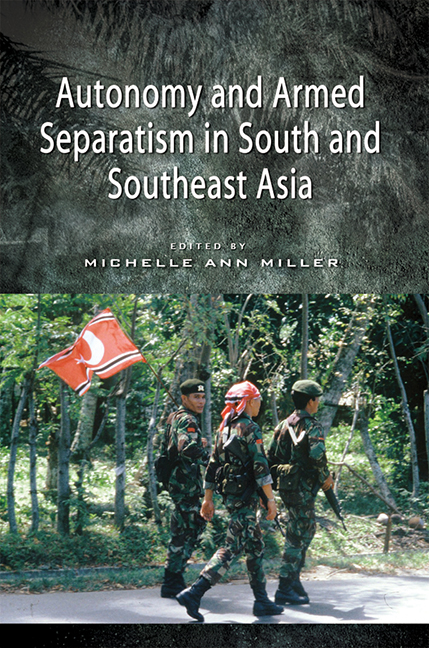Book contents
- Frontmatter
- Dedication
- Contents
- Acknowledgements
- About the Contributors
- 1 The Problem of Armed Separatism: Is Autonomy the Answer?
- 2 Mediated Constitutionality as a Solution to Separatism
- 3 Self-Governance as a Framework for Conflict Resolution in Aceh
- 4 Autonomy and Armed Separatism in Papua: Why the Cendrawasih Continues to Fear the Garuda
- 5 The Parallels and the Paradox of Timor-Leste and Western Sahara
- 6 Between Violence and Negotiation: Rethinking the Indonesian Occupation and the East Timorese Resistance
- 7 Struggle over Space in Myanmar: Expanding State Territoriality after the Kachin Ceasefire
- 8 Sri Lanka's Ethnic Conflict: The Autonomy-Separation Dialectic
- 9 Unitarianism, Separatism and Federalism: Competing Goals and Problems of Compromise in Sri Lanka
- 10 Autonomy and Armed Separatism in Jammu and Kashmir
- 11 Armed Conflicts and Movements for Autonomy in India's Northeast
- 12 Southern Thailand: The Trouble with Autonomy
- 13 The Last Holdout of an Integrated State: A Century of Resistance to State Penetration in Southern Thailand
- 14 Interlocking Autonomy: Manila and Muslim Mindanao
- 15 History, Demography and Factionalism: Obstacles to Conflict Resolution through Autonomy in the Southern Philippines
- 16 Conclusion
- Index
16 - Conclusion
Published online by Cambridge University Press: 21 October 2015
- Frontmatter
- Dedication
- Contents
- Acknowledgements
- About the Contributors
- 1 The Problem of Armed Separatism: Is Autonomy the Answer?
- 2 Mediated Constitutionality as a Solution to Separatism
- 3 Self-Governance as a Framework for Conflict Resolution in Aceh
- 4 Autonomy and Armed Separatism in Papua: Why the Cendrawasih Continues to Fear the Garuda
- 5 The Parallels and the Paradox of Timor-Leste and Western Sahara
- 6 Between Violence and Negotiation: Rethinking the Indonesian Occupation and the East Timorese Resistance
- 7 Struggle over Space in Myanmar: Expanding State Territoriality after the Kachin Ceasefire
- 8 Sri Lanka's Ethnic Conflict: The Autonomy-Separation Dialectic
- 9 Unitarianism, Separatism and Federalism: Competing Goals and Problems of Compromise in Sri Lanka
- 10 Autonomy and Armed Separatism in Jammu and Kashmir
- 11 Armed Conflicts and Movements for Autonomy in India's Northeast
- 12 Southern Thailand: The Trouble with Autonomy
- 13 The Last Holdout of an Integrated State: A Century of Resistance to State Penetration in Southern Thailand
- 14 Interlocking Autonomy: Manila and Muslim Mindanao
- 15 History, Demography and Factionalism: Obstacles to Conflict Resolution through Autonomy in the Southern Philippines
- 16 Conclusion
- Index
Summary
The path to peace and away from armed separatist conflict is never a smooth or linear process. Intense or protracted periods of fighting tend to squeeze out the political middle ground where support for negotiated settlements is most strongly situated. Even when the warring parties agree to participate in peace talks, they often do so without first relinquishing their intransigent nationalist ideologies and zero sum end games. In many cases, the institutional design of the autonomy package is not mutually agreed upon by the key players in the conflict, the implementation of autonomy is only partial or lackluster, and/or the conciliatory spirit of autonomy is subverted by the concurrent enforcement of more repressive and militaristic approaches to conflict resolution.
This book began with the dilemma of how much freedom to grant disenfranchised minorities without releasing control over the parent state's sovereign territories to armed separatist insurgents. Autonomy was presented as a potential compromise solution for the men and women who take up arms as the most extreme means of seeking redress for the real or perceived shortcomings of the parent state by fighting to create their own independent polity. The case studies in this volume explored a range of possible outcomes to the central question of whether autonomy has, or could potentially serve as an effective mechanism for managing armed separatist sentiment and activity in South and Southeast Asian contexts.
Three broad answers to this core question have been borne out by the cases in this volume, although these are marked by a high level of internal differentiation. In general terms, the examples reviewed in this book may be categorized as those which: (a) prove the proposition that autonomy is an effective mechanism for managing armed separatist disputes, (b) refute the claim that autonomy helps to stem the specter of armed separatism, or (c) neither prove nor disprove the argument for or against autonomy in the absence of a decisive military victory or a clear political settlement. Most of the case studies in this book fall into the third category and thus remain explosive laboratories for experimentation in the continuing search for conflict resolution in this long-troubled region.
- Type
- Chapter
- Information
- Autonomy and Armed Separatism in South and Southeast Asia , pp. 296 - 304Publisher: ISEAS–Yusof Ishak InstitutePrint publication year: 2012



